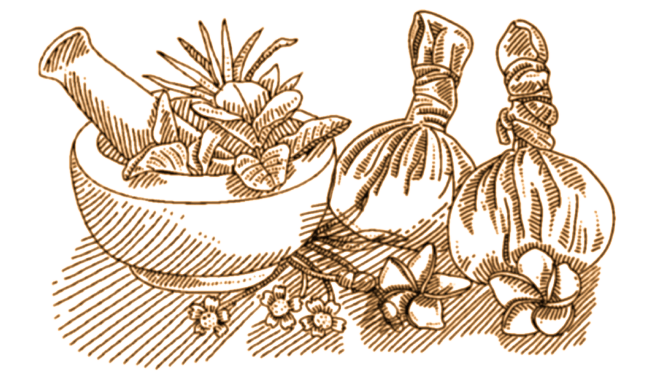
An emerging and effective way to deal with these complicated scenarios is through alternative medical or holistic treatments. Ayurveda is the leader in this avenue. This system understands the functioning of the human body as a whole and any disease is understood to be due to an imbalance of the three Doshas – Vata, Pitta, and Kapha. Ayurveda therapy validates the physical, psychological, and spiritual wellness of an individual.
It takes a well-rounded approach to therapies by suggesting lifestyle changes, tackling addictions, detoxification of the whole body, as well as mental and spiritual healing. Acharya, Ratricharya, Ritucharya, Panchakarma, Abhyangam, etc. are all part of the regimen of Ayurveda. Shirodhara treatment, which involves a constant stream of herbal oils being poured on the forehead, is especially effective in relieving stress and centering the energies of the body, and focusing them on self-healing.
DIABETES (Prameha)
Type 2 diabetes refers to a condition where cells cannot utilize glucose or blood sugar efficiently for energy. This occurs when the cells become insensitive to insulin, and the blood sugar levels gradually become too high. A combination of several factors like broken beta cells, extra weight, metabolic syndrome, etc., are responsible for the cause of this lifestyle disease. In Ayurveda, diabetes is referred to as Madhumeha (literally meaning sweet urine). Diabetes mellitus is referred to as Vata Prameha. It crops up because of an imbalance in the Vata Dosha (one of the three functional energies in the body). Diabetes insipidus is referred to as Kapha Prameha. This occurs because of the Kapha Dosha imbalance.
OBESITY (Sthaulaya)
Individuals become obese because of unhygienic and unhealthy eating habits, reduced physical activity, stressful lifestyles, and other factors. Obese individuals have a body mass index (BMI) greater than 25, and they suffer from cardiovascular diseases, breathing problems, blood pressure, and diabetes. This is a primary disorder that can result in several other chronic diseases in an individual.
In Ayurveda, Atisthaulya (Obesity) is described as excessive accumulation of Meda (fat/adipose tissue) and Mamsa (flesh/muscle tissue) leading to flabbiness of hips, abdomen, and breast. It is considered one of Santarpanottha Vikaras (diseases due to the consumption of excessive calories) in Ayurveda. Medodushti (disorders of fat metabolism) may be one of the risk factors for Ischemic Heart Disease (IHD).
HYPERTENTION (Raktagatavata)
Hypertension or high blood pressure refers to the tension or high pressure in the arteries - the vessels responsible for carrying blood from the heart to the rest of the body. The various complications of hypertension are kidney (renal) disease, heart disease, eye damage, stroke (brain damage), and hardening of the arteries (arteriosclerosis or atherosclerosis).
In Ayurveda, hypertension is a vata imbalance known as Raktagata Vata. In this condition, the vitiated Vata gets lodged in the circulating Rakta Dhatu (blood) and causes disturbances in its circulation.
MIGRAINE (Ardhavbhedak)
Modern medicine defines migraine as a neurological disease resulting in a throbbing headache that can cause severe pain accompanied by a pulsating sensation, usually on one side of the head. In most cases, migraine can also result in nausea, vomiting, and unusually high sensitivity toward sound and light. Most of the time, the pain areas are the eyes, neck, nose, head, and face.
According to Ayurveda, migraine (Ardhavabhedhaka) is a concern that crops up due to an imbalance in the Dosha levels. This shift in the Dosha levels can cause poor eye health, disturbed sleep cycles, inability to concentrate and focus, and loss of productivity.
THYROID (Medoagni mandya)
Ayurveda approaches thyroid imbalance through the lens of doshas. From the Ayurvedic perspective, an underactive thyroid is a Kapha condition. The qualities of kapha are heavy and slow which align with the symptoms of an underactive thyroid. Slow metabolism or manda agni is common amongst Kapha individuals and those with a Kapha imbalance.
Hypothyroidism is categorized into five types based on whether Vata causes it, Pitta, Kapha (Air, Fire, and Water elements in the body) or urinary tract infections (mainly in females), and ultimately, the "goiter" type, which is characterized by a noticeable swelling of the thyroid gland around the neck. The advanced stage of Kapha-induced hypothyroidism is thought to be the "goiter" variety. Furthermore, the Vata-induced disease contains a psychological component caused by mental agitation and stress and a physical component caused by excessive physical exertion. And Pitta is the sole cause of hyperthyroidism.
Book An Appointment

 Mediclaim Facility Available
Mediclaim Facility Available
 In-house Ayurveda Products & Therapies
In-house Ayurveda Products & Therapies
 Experienced Ayurveda Doctors
Experienced Ayurveda Doctors






